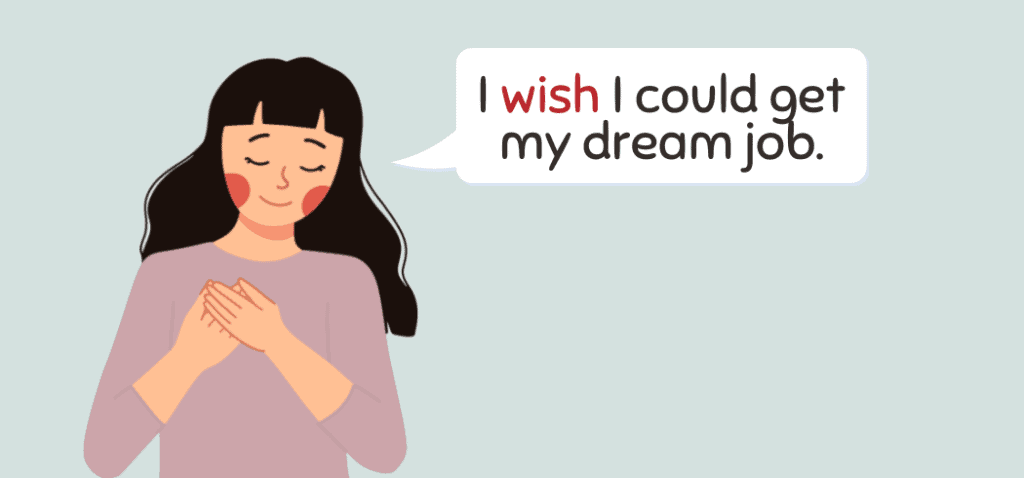All of us have wishes for the future. Some might even have wishes for past events. But what is the right way to express these strong desires when writing and speaking?
Using wish in a sentence can be tricky because we sometimes use it with other verbs. I’ll show you how you can use wish in grammatically correct sentences. Then, answer the worksheet I made to test your knowledge.
How to Use “Wish”

To wish means to have a desire for something. The past tense of wish is wished, while the future tense is will wish.
Can You Use “Wish” With Past Tense?
Of course! You can use wish in a present tense form with other past tense forms to show a present wish. For example:
- I wish I lived near you.
- She wishes she had a new laptop.
- I wish we wouldn’t be busy tomorrow.
Do not use will and can to talk about wishes for the future. Instead, use past tense modals would and could. For example:
- I wish she could have a happy birthday.
- I wish my parents would allow me to go out next week.
- The class wishes it would be sunny tomorrow.
You can also use the past tense for be verbs. Instead of is, are, and am, use was or were. For example:
- She wishes she wasn’t hungry all the time.
- I wish it wasn’t too hot in this country.
Can You Use “Wish” With Present Tense?
You cannot use wish with other verbs in the present tense. If you want to make wishes for the present, use the past simple with the present tense. For example:
- I wish I lived in Scotland. The culture and infrastructure there are beautiful.
In this sentence, I wish is in the simple present tense, while I lived is in the simple past tense.
I’d also use the simple present tense with the continuous form for present wishes. For example:
- I wish we were shopping, but I have no money.
In this sentence, I wish is in the simple present tense, while we were shopping is in the past continuous tense.
Here are more I wish examples in present form.
- Jimmy wishes you were free tomorrow.
- I wish we were traveling to Europe.
Can You Use “Wish” With Past Perfect Tense?
Sometimes, we make wishes for past situations even if they’re already done. Use the past perfect for this situation. For example:
- I wish I had taken an internship last month.
- Roan wishes Jonah had listened to her.
“Wish” + To-infinitive Form
When we use the to-infinitiveafter the word wish, it means the same as want. However, we use wish for a formal situation and want for informal situations. For example:
- I wish to leave now.
- I want to leave now.
“Wish” + Indirect Object + Direct Object
You can use wish with two objects, an indirect and a direct object. For example:
- I wish you happiness in every choice you make.
In this sentence, you is the indirect object, and happiness is the direct object.
“Wish” + Object + To-Infinitive
You can use wish with an object and an infinitive. For example:
- I wish the dancers to perform their best choreography.
- I do not wish my enemies to be sorry.
“Wish” Summary
Now you can make sentences with wish, right?Let us know if you have other questions about it. Just remember thatthis verb talks about things we want but might not be possible. You can use it with past, past continuous, and past perfect forms. Another verb that might confuse you is hope.